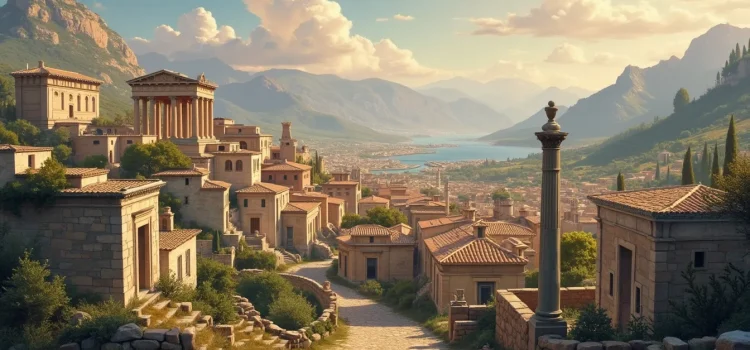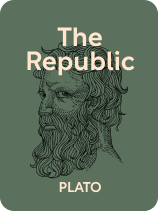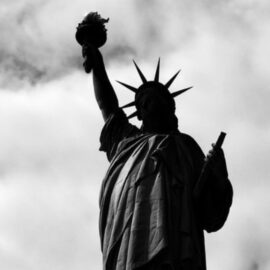

This article is an excerpt from the Shortform book guide to "The Republic" by Plato. Shortform has the world's best summaries and analyses of books you should be reading.
Like this article? Sign up for a free trial here.
What does the ideal society look like? Has a philosopher from ancient Greece already designed one?
In The Republic, Plato presents his vision of a perfect city-state. Through the character of Socrates, he outlines a society with a strict class system, communal living for some, and a “noble lie” to maintain order.
Keep reading to explore the ins and outs of Plato’s ideal society.
Plato’s Ideal Society
To answer the challenge to his concept of justice, Socrates sets out to first describe the perfectly just man. He suggests that the soul of a man is a lot like a society—both can be described as ”just,” and both are made up of components working together to form a cohesive whole. In addition, Socrates says, justice is easier to observe and describe on the scale of an entire society than it is in the life of an individual. Therefore, he describes a perfectly just society to serve as an analogy for a perfectly just individual. This is how Plato’s ideal society is presented in The Republic.
(Shortform note: It might seem like a big leap in logic to assume that an individual is analogous to a society. Many scholars agree—the validity of the “city-soul analogy” is a common topic of discussion and debate. Critics argue that Socrates makes this analogy without offering a definition of justice that could reasonably apply to both individuals and cities. In other words, he assumes justice applies to both before he knows what justice is. Defenders of the analogy argue that the rest of The Republic shows how individual justice and societal justice stem from the same source: rule by reason.)
The Class System
Socrates argues that an ideal city has a class system enforced by the government. Different people are good at different things, Socrates explains, and in an ideal city everyone performs the role best suited to them. Therefore, people must be assigned to their ideal roles and must remain in them to develop their skills.
(Shortform note: The ideal city’s government-enforced class system is an example of corporatism, or a political and economic system where various social classes or corporations work together toward the benefit of all. Historically, corporatist systems have consisted of private industries and labor unions working closely with their governments to coordinate economic plans, often keeping each other’s ambitions in check so everyone can benefit. In Plato’s corporatist system, however, the various classes are all aligned in their aims and don’t compete.)
Socrates separates the ideal city into two overall classes: the workers and the protectors.
1) The Workers
Socrates explains that the workers perform the labor necessary for the function of a city, acting as farmers, tradespeople, merchants, doctors, and so on. Because they’re experts at these technical skills and not politics, workers in the ideal city have no political power. Socrates acknowledges that a powerless class could grow discontent, though, and suggests that the city permit workers to own private property and a large majority of the wealth they create. Then, they’ll be satisfied with their various luxuries and won’t cause unrest.
(Shortform note: Some philosophers view the ideal city and its treatment of the working classes as one of the first conceptions of a socialist society. Plato’s emphasis on equality and a centrally planned economy resemble some of the features that would come to define later proto-socialist or socialist projects. For example, Plato argues that workers should be entitled to a large majority of the wealth their labor produces. This argument was repeated by early socialist thinkers like 19th-century Welsh philosopher Robert Owen, who argued workers should communally share all of the wealth they produce.)
2) The Protectors
The protectors serve as the military, police, and executive officials of the ideal city, carrying out the law but not creating it. Socrates explains that children who show the qualities of a good protector—courage, physical fitness, and so on—are taken from their families to live separate from the city. There, they live communal and minimalist lifestyles so they don’t become accustomed to or desire material wealth. They receive extensive moral and physical education teaching them to use their power for the good of the city as a whole and not for their ambitions. Once they come of age, they’ll strategically breed to create the most capable offspring and raise them communally as well.
(Shortform note: Crucially, Socrates says all children will be educated and can potentially become protectors—including women. This was a radical view for ancient Athens, a society that largely considered women to be vastly inferior to men. Plato’s feminism mainly comes from the fact that he’s more interested in the development of the mind than he is in the body. Since he doesn’t think there’s a significant difference between the minds of men and women, he views them as equals. Some scholars disagree with the characterization of Plato as a feminist, suggesting he supports equality as a pragmatic—rather than ideological—measure for building an efficient city.)
The Noble Lie
Socrates believes that to ensure the stability of the ideal city and keep people satisfied with its strict class system, the city must use a noble lie, or a myth about the city that justifies its class system. According to the noble lie, people in the ideal city are born from the earth with certain metals in them. Those with gold in them are destined to be rulers, those with silver will be protectors, and those with bronze will be workers. Any disruption of this system will destabilize and harm the ideal city.
(Shortform note: Many scholars suggest the term “noble lie” doesn’t appropriately translate the concept. According to them, the noble lie isn’t a deception that everyone in the ideal city is tricked into believing literally. Instead, it’s more of a founding myth or principle people want to live by. Another example of this is “all men are created equal.” People don’t believe this is literally true, but many believe it’s a principle that society should be organized around. In Plato’s case, that principle is “people are suited for different things and should perform the roles expected of them.”)
| Plato the Dictator? One famous interpretation of The Republic comes from 20th-century philosopher Karl Popper, who argued that Plato’s political philosophy is totalitarian. Popper points to the social rigidity of the ideal city as evidence that Plato believed in greatly restricting individual freedom, believing Plato’s overall goal was to prevent any kind of social or political change. For example, people in the ideal city are permanently placed into specific classes that determine in large part how they’ll live. Popper goes on to argue that Plato has had a strongly anti-democratic impact on Western society and culture, and that his philosophy served as the origins of other totalitarian ideologies like fascism. Over the decades, Popper’s interpretation of The Republic has attracted lots of criticism from other scholars who believe that it ungenerously draws parallels between views that existed in vastly different historical and political contexts. Nonetheless, Popper’s description of the ideal city as a totalitarian state is still debated to this day. |

———End of Preview———
Like what you just read? Read the rest of the world's best book summary and analysis of Plato's "The Republic" at Shortform.
Here's what you'll find in our full The Republic summary:
- Plato’s concept of justice
- Why living a moral life is good for its own sake
- How later philosophers interpreted and responded to the ideas in The Republic






